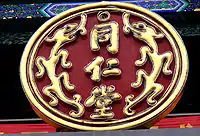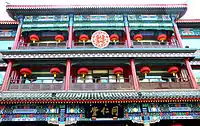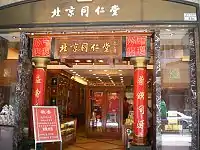Tong Ren Tang
Tong Ren Tang (TRT; Chinese: 同仁堂) is a Chinese pharmaceutical company founded in 1669, which is now the largest producer of traditional Chinese medicine (TCM). The company is headquartered in Beijing, and is engaged in both manufacture and retail sales, operating drug stores predominantly in Chinese-speaking regions. Tong Ren Tang is considered one of the "Big 4" traditional Chinese medicine brands still in existence. The four companies include (listed in order of age not size): Guangyuyuan (1541 AD), Guangzhou Chen Liji (1600 AD), Beijing Tong Ren Tang (1669), and Hangzhou Hu Qing Yu Tang (1874). Tong Ren Tang and GuangYuYuan have been officially recognized as "China Time-Honored Brands" by the Ministry of Commerce of the People's Republic of China.[1]
 Tongrentang sign board at the Beijing headquarters | |
Native name | 同仁堂 |
|---|---|
Romanized name | Tóngréntáng |
| Type | Public |
| SSE: 600085 | |
| Industry | Pharmaceutical |
| Founded | 1669 |
| Founder | Yue Xianyang |
| Headquarters | Beijing , China |
| Revenue | 396,750,300,000 renminbi (2018) |
| Website | www |



History
In 1669, the eighth year of the reign of the Kangxi Emperor in the Qing dynasty (1644-1911), Tong Ren Tang was established in Beijing by Yue Xianyang who served as a senior physician at the Qing imperial court. In 1702, the company relocated within Beijing to the address from which it has operated ever since. In 1723, Tong Ren Tang was appointed the sole supplier of herbal medicines to the imperial court by the Yongzheng Emperor and remained in that position until the collapse of the Qing dynasty in 1911. In 1924, the company Tiger bone wine was awarded at the Leipzig Trade Fair, making the product the most popular type in commerce.[2]
Modern development
Like many older Chinese companies, Tong Ren Tang has struggled to adapt to market changes. In recent years, Tong Ren Tang has modernized its facilities, and changed its trade name to Tongrentang. It remains one of the oldest surviving brand names for traditional Chinese medicine, and has wide name-recognition among Chinese and Asians worldwide. It is also one of the world's largest TCM companies, with products sold in countries all over the world.
Hutchison Whampoa Ltd. invested in Tong Ren Tang Technologies’ in 2000 by subscribing six million shares in the company. Page 17 of Prospectus[3] Hutchison Whampoa Ltd., previously had two joint ventures with Tong Ren Tang.[4] Page 6 of Prospectus[5]
In 2001, Tong Ren Tang, in collaboration with Germany-based Mirahi Biotech, diversified into skincare products. Using state-of-the-art western technologies and the vast cache of herbal medicines of Tong Ren Tang, the collaboration has come up with an impressive list of products. In 2008, the exclusive U.S. distributorship is licensed to a California corporation, Denosim Incorporated, and the products are being distributed by MIRAHI Skincare, Inc., San Jose, California, USA.
In 2004, Tong Ren Tang invested 150 million Hong Kong dollars in the construction of a manufacturing plant in Hong Kong.
In October 2007, Tong Ren Tang and an American company called Greater China Corporation jointly announced the formation of a partnership under the name Tong Ren Tang Wellness Corporation to "develop spa-like wellness centers that will provide treatments and products based upon China's famous TongRenTang herbal medicines. These will include acupuncture, massage, acupressure, Tuina, T'ai chi, Qigong, reflexology and many other oriental treatments as well as a full line of herbal foods and health products".[6]
In 2020, the company began to expand into a chain coffee business, which turned part of the drugstore into a coffee shop, selling coffee and milk tea with herbs. This business is called "ZhiMa Health". The company aims to attract young consumers back to the traditional Chinese medicine market through Zhima Health.[7] This service is only available in Beijing for the time being.
Intellectual property
Tongrentang's products are often counterfeited both inside and outside China. China's Ministry of Commerce notes that "Tongrentang...and others have had their names and brands illegally registered by other Chinese and overseas manufacturers, resulting in a predicament in exports, multinational exchanges and potential economic losses."[8]
References
- "Certification of China Timed-honored Brand GuangYuYuan". zhlzh.mofcom.gov.cn. China's Ministry of Commerce. Retrieved 27 September 2017.
- "即將消失在歷史長河中的一款藥酒——虎骨酒鑒賞". PTT News. 22 August 2018.
- http://doc.irasia.com/listco/hk/tongrentang/listingdoc/l001024.pdf
- http://www.ckh.com.hk/en/media/press_each.php?id=1294
- http://doc.irasia.com/listco/hk/tongrentang/listingdoc/l001024.pdf
- Greater China Corporation Forms TongRenTang Wellness Corporation.
- Wang.XY (2020-07-22). "Tong Ren Tang, a traditional Chinese medicine brand, will enter the coffee chain". Panda!Yoo. Retrieved 2020-07-28.
- China's Established and Famous Brands Are Fading, Chinese companies learn to protect their IPR
